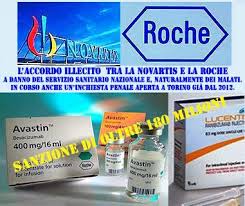by ROSARIO DI RAIMONDO 05 May 2014 R.it Bologna
“Non esiste alcuna differenza tra i due farmaci Avastin e Lucentis per quanto riguarda la sicurezza del loro utilizzo da parte dei malati di maculopatia retinica”. E’ quanto afferma la Regione Emilia-Romagna, basandosi su uno studio affidato a Cochrane, il più autorevole organismo no-profit internazionale indipendente in quest’ambito sanitario. Proprio per questi due farmaci, le due aziende produttrici – Roche e Novartis – sono state multate dall’Antitrust per 180 milioni di euro, con l’accusa di fare cartello per imporre sul mercato quello più costoso, il Lucentis, che costa tra i 1.000 e i 1.100 euro rispetto ai 16-20 del primo.
“Tutti gli studi considerati hanno confrontato direttamente i due farmaci: è emerso così un quadro scientificamente rigoroso e completo sui livelli di sicurezza dei due medicinali. Non esistono differenze tra le reazioni avverse, quindi sui livelli di qualità e sicurezza dei due prodotti, per i malati trattati con Avastin o con Lucentis”, prosegue lo studio.
Secondo una stima della Regione, ogni milione di euro speso in più ogni anno per il farmaco più costoso corrisponde “a circa 12 medici, o 28 infermieri, 34 ausiliari, 44mila visite specialistiche”. La stessa Emilia-Romagna ha avuto un ruolo fondamentale in questa guerra contro Big Pharma, come hanno spiegato oggi in conferenza stampa l’assessore regionale alla Sanità Carlo Lusenti, il direttore generale Tiziano Carradori e vari esperti di viale Aldo Moro.
Già dal 2009, infatti, negli ospedali emiliani era stato autorizzato l’Avastin, cioè il medicinale più economico, “non autorizzato dall’Aifa ma di comprovata efficacia”. Ne è nata una guerra giudiziaria tra Regione e Novartis, con l’azienda farmaceutica che ha impugnato la decisione dell’assessorato alla Sanità. Domani, 6 maggio, è attesa una decisione della Corte costituzionale il cui esito potrebbe definitivamente dare ragione all’Emilia-Romagna.
Novartis-Roche: how it turned out
by Domenico De Felice | May 5, 2014
While waiting for the Superior Council of Health, at the request of the Minister of Health Beatrice Lorenzin, express your opinion on the Lucenti-Avastin case the two drug multinationals bought pages of the newspaper, to explain to citizens, and sent letters to parliamentarians,to defend their positions.
I remind you that the two ophthalmological drugs, used in cases of alteration of the central retina, are superimposable from a clinical point of view, as detailed by two scientific studies, and that the WHO has indicated the one that costs less, Avastin, as the only one to use while, still today, the Italian state reimburses the most expensive with a monthly expense of 50 million euros. Now the two multinationals are going on the attack.
The news of Roche's appeal to the Lazio Regional Administrative Court against the cartel agreement imposed by the Antitrust last March came on Friday.
While Novartis sues the Emilia Romagna region for damages which authorized, with its resolution, the use of Avastin in public facilities.
Everything gets complicated. The Minister of Health awaits the Superior Health Council, which is silent for now, and does not intervene on Aifa, which does not listen to the WHO. The drug multinationals field their information and legal studies.
Poor citizens, defenseless from politicians who are thinking about the upcoming elections, especially if they are patient, are dumbly worried. Europe looks at Italy and its Minister of Health, who is presenting himself at the European elections, who is unable to impose his voice. The neverending story continues on the "skin" of Italians.
